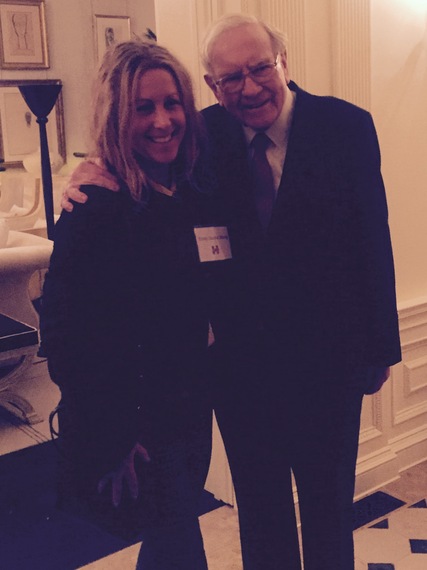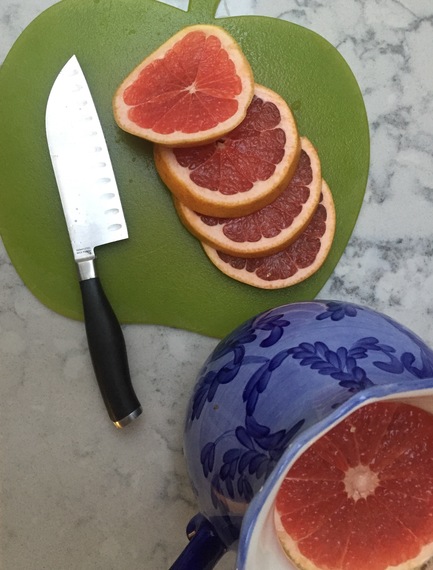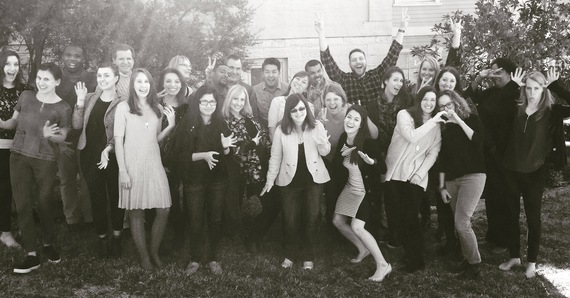
"Money is of no value to me. Love gives you more. You can't get rid of love, when you give more, you get more." --Warren Buffett
My friend Emily Sachs Wong texted me these words after having dinner with Warren Buffett, I have no idea what they were eating and for the first time in my life I wasn't interested. Perhaps because when someone says something like that, you just let it soak in. I was struck by the fact that he so clearly expressed what seemed to me to be a profound statement about what is important in life.
February is heart month and organizations like Go Red for Women are focused on keeping women healthy, their "mission is to build healthier lives, free of cardiovascular diseases and stroke." According to their website, heart disease is the #1 killer of women and the work they are doing to educate, and raise awareness and funds to prevent heart disease is impactful. This month has me thinking about what it means to have a healthy heart - even beyond the medical stats - and how I can create more of the happiness that comes with that in my own life.
The World Health Organization states that: "Health is a state of complete physical, mental and social well-being and not merely the absence of disease or infirmity." Their core principles also state that the "enjoyment of the highest attainable standard of health is one of the fundamental rights of every human being without distinction..." Regardless of sector, race, or age, we all want the same things for our families and ourselves: as my mother says, "health, happiness, safety, the strength to cope with anything that comes our way." Here are six practices that help me get a little closer to whole heart health.
1. Cook for Your Life!
Cooking is my love language. I built my career and life's work around the idea that food nourishes the body and soul and brings us together with the people that we love. There is little else that brings me as much pleasure as feeding my family and friends home-cooked food. My friend Tamron Hall recently said, "Love is the religion and food is the house." When cooking and eating healthy meals with the ones we love becomes part of our vocabulary, it becomes ritual.
Cooking healthfully does not have to be overly complicated. At Common Threads, the nonprofit organization that I co-founded, we teach students, families, and teachers the basics as they navigate mealtimes: 1. Portion Size, 2. Preparation Style, 3. Paint Your Plate with Color, and 4. Participation. Food is fuel and the table can be the gathering place that brings families together.
2. Make Healthy Choices.
Make the healthy choice: it all adds up. In my Huffington Post blog, "5 Surefire Tips For Being A Healthy Road Warrior," I outline how I try to make healthy choices on the road. Those can be translated to day-to-day life, whether on the road or at home. The daily things that keep me going are simple: drinking more water, only moderate amounts of caffeine and alcohol, planning ahead, and being physically active.
Staying hydrated is one of the most basic things we can do to keep our bodies functioning smoothly. Symptoms of mild to moderate dehydration include sleepiness, thirst, headaches, and more. It is definitely a chore for me but I have to admit - the hype is legit; it feels really great to be hydrated. Fruit scraps, cucumber, mint, basil, and even a teaspoon of chia help me work it out. Checking out the menu ahead of time helps me manage my ordering excitement at restaurants, keeps me on track and on budget, while letting me focus on the people I am with.
Staying active and moving every day is also key for me. Workouts reduce my stress level, help keep me happy and smiling each day, and are one of the most important things I can check off my list. Cardio sessions are also mentally productive times for me whether I am working through a challenge, strategizing, or prioritizing, some of my best brainstorms happen on my walks and runs. As an added bonus I am modeling this healthy form of self-care for my kids, who even join me once in a bright blue moon.
3. Be a Lifelong Learner.
In a report by the Adult Education Committee of the British Ministry of Reconstruction, it was concluded that "adult education is a permanent national necessity, an inseparable aspect of citizenship, and therefore should be both universal and lifelong."
Engage in learning in your own community. Many school districts offer parent education classes on different styles of learning and there are countless resources available online (much of it is free): TED Talks about the future of education and learning; recommended reading lists for educators that parents can also take advantage of; KHAN Academy - a nonprofit offering free education on math, methods for motivating different types of learners, and other subjects; Love and Logic, a positive discipline parenting approach; online museums offerings; and so much more.
I have learned a lot by listening to my network of community, school administration, family, and friends as they discuss some of the cooler curriculums, technology applications, and continuing education programs out there. Not only have I applied the information in my own parenting, but it has helped inform how Common Threads evolves as a curriculum provider. Best in class curriculums weave in lessons and principles that align with Common Core Standards, Social and Emotional Learning, STEM, STEAM, and Social Thinking.
Beyond academics, there is a world of discovery in the arts and their ability to open our hearts. After-school art-based programs play a critical role in supplementing school-based learning to address the needs of the whole child. A ten-year national study by Shirley Brice Heath of Stanford University discovered that young people who are involved in arts-based community programs in under-resourced communities have more academic success as a result.
4. Don't Underestimate the Power of Your Mental Health.
Mindfulness is moving into the mainstream. In his book, 10% Happier, news correspondent Dan Harris chronicles his journey to finding a mindfulness practice that suited him and how it allowed him to respond to a situation thoughtfully rather than just react. As he describes it, he was able to "tame the voice" inside his head. He is not the only one...
The U.S. Marines, U.S. Veterans, Seattle Seahawks, Google, General Mills, and Aetna are among the reputable organizations that have identified how beneficial mindfulness is for their members and employees. They are leading by example and equipping employees with the tools that are effective in positively affecting everything from everyday stress to trauma. Tuning into the moment and observing things in a nonjudgmental way encourages a more compassionate way of relating with your world.
I used to put yoga in my physical health bucket but now I really see it as a mental practice that allows me to create space for myself to reset. In the same way that your friendly United Airlines flight attendant would instruct you to first put on your own oxygen mask before helping others around you, taking that time for myself allows me to better take care of friends, family, and colleagues.
5. Operate From a Place of Gratitude and Choose Happiness.
Remembering to choose happiness and make every breath count is one of the best ways to honor the people we care about and the ones we have lost. According to a recent CBS News article, our health could benefit from the focus on gratitude as well. The article cites numerous health perks that come from actively recognizing things we are grateful for, including contributing overall wellbeing, improvement in heart health, greater life satisfaction, more self-control, and a link in teens has even attributed gratitude to less likeliness of abusing drugs and alcohol.
Making time for moments with the people that bring out my best, who make me laugh and who will be silly with me is a priority. Life is short. Make time for a meal, coffee, walk, or call with those sparklers.
I recently came across the idea of a "Gratitude Jar," and have implemented the ritual in my house. We have a mason jar that we fill with notes that symbolize a special moment or experience that moved us; at the end of the year we will open it and go through our little pieces of paper. At our recent All Staff Meeting, each of our team members had a jar and everyone filled each other's jar with "bucket fillers," this exercise in gratitude reminds us of the power of celebrating one another.
6. Give Back and Practice Compassion.
Social injustices and inequity gaps can seem overwhelming, but your own volunteer efforts don't need to be. In 2015 I wrote about the growing skill based volunteer field and the numerous benefits to not only the companies and organization receiving the volunteer hours and efforts, but also to those doing the volunteering.
According to a study conducted by UnitedHealth Group in 2013, 76% of those surveyed who had volunteered in the last 12 months reported that it made them feel healthier, 94% claimed that it improved their mood, 78% said it lowered their stress levels, and 96% felt that their sense of purpose was enriched. Get involved in an issue you are passionate about and those you are helping won't be the only ones reaping the rewards. On a larger scale, seek out corporations, companies, and employers that invest in society and helping. By becoming customers of those companies you are supporting them with your dollars.
My own organization, Common Threads, relies heavily on the support of our passionate and involved volunteers. In the 2014 calendar year we logged a total of 22,020 volunteer hours!
Whole Heart Health
Seeking out a happier life does not mean that you are unhappy, but that you want a different way of being in the world. In her book, The Happiness Project, Gretchen Rubin articulated what creating more happiness means to her. "I wanted to change myself but accept myself. I wanted to take myself less seriously - and also more seriously. I wanted to use my time well, but I also wanted to wander, to play, to read at whim..."
The Dalai Lama said, "...the very purpose of our life is to seek happiness. That is clear...we all are seeking something better in life. So, I think, the very motion of our life is towards happiness..." He maintains that our happiness is created through our own actions. We must intentionally make choices that will bring us more happiness, and as a result our hearts will most certainly be healthier.



